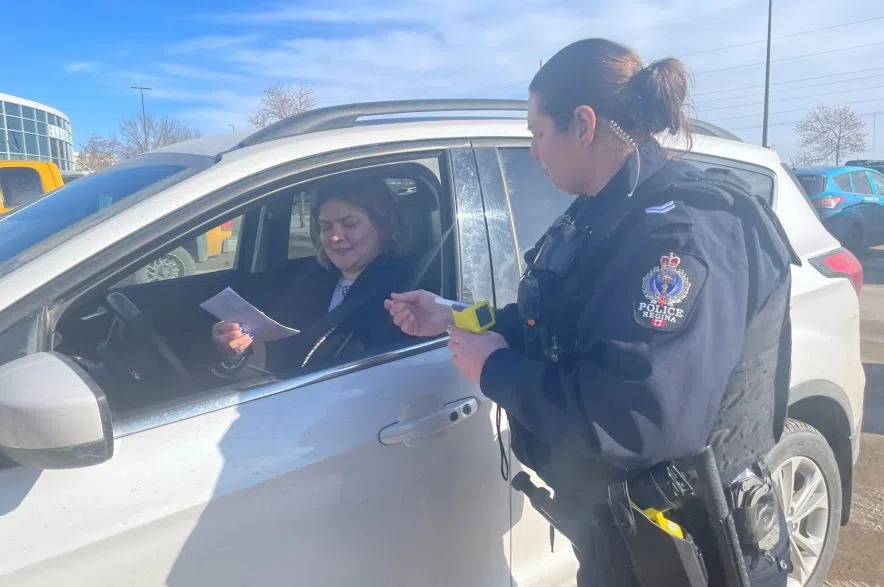People in Regina could be subject to a mandatory roadside alcohol screening test the next time they’re pulled over.
Whether it’s for speeding, a broken headlight or a rolling stop, SGI and the Regina Police Service say officers have the ability to demand any driver to take a roadside test.
RPS Sgt. Shannon Gordon said police have had this power under federal law since 2018 under a Section 320.27(2) of the Criminal Code, but many drivers are unaware of that fact.
Gordon was asked during a media event Friday if the policy was constitutional.
“It has been challenged in Saskatchewan and the Saskatchewan Court of Appeals has upheld the (constitutionality) of it,” she said.
“I believe that there (have) been Supreme Court of Canada challenges. I don’t know that there have been official decisions handed down from those yet.”
Gordon referenced Section 1 of the Charter of Rights and Freedoms, which talks about the individual rights of a person not superseding the safety of the community as a whole.
“Much like when we go to an airport and we’re subjected to a search (and) much like when we go to many concerts (or) sporting events (and) we’re subjected to a search, it’s the same premise as an individual on the roadway or going to a concert (or) going on an airplane (or) going to large public gatherings,” she said. “We have a duty as an individual to ensure the safety of all those sharing in that event.”
Gordon said Regina police approached SGI about the initiative.
Gordon was also asked if the RPS feels it could lose some public trust with the initiative.
“We’re hoping that they see it as us working harder to keep them safe on the road,” she said.
“If they’re not drinking and driving, they have nothing to fear from the sample and my hope is that they look at that and they think we’re out there working extra hard to get those drivers off the road so that their loved ones are not killed or injured from impaired drivers.”
SGI spokesperson Tyler McMurchy said drivers who fail to comply can be hit with the same penalties they’d get if they failed the roadside test.
McMurchy said the right to demand roadside tests is limited to alcohol because the test is very quick compared to a swab, which requires reasonable suspicion.
“If you haven’t been consuming alcohol, you don’t have to worry about what’s going to happen if you take this test,” McMurchy said.
He noted the approved screening device is separate from the breathalyzer or intoxlyzer, which are used to formulate evidence for criminal charges. McMurchy also said failing the screening will not necessarily substantiate a criminal charge by itself.
“We’re still seeing impaired driving on our roads,” he said. “We’ve seen substantial culture change in Saskatchewan when it comes to impaired driving. When you look at compared to a decade ago, the number of collisions, injuries and fatalities have decreased substantially. However, some people are still making the choice to get behind the wheel after drinking or using drugs.
“Every injury and every fatality that happens as a result of impaired driving is completely unnecessary and was completely preventable because nobody ever needs to drive impaired.”
McMurchy said the federal government is responsible for the law.
“But SGI doesn’t want anybody to get in trouble and we’d like drivers to do things that (keep) them safe,” he said.
McMurchy said there has been a slight decrease monthly in Criminal Code charges reported by police, but there has been a substantial increase in administrative roadside suspensions.
“That is driven largely by the increase in drug-related suspensions and one of the reasons for that is not that necessarily more people are using drugs, but more people are getting caught because police have access to those roadside fluid testers,” McMurchy said.
Gordon said the chances of someone being pulled over solely for checking sobriety is very slim.
“There is usually an accompanying infraction that has happened that has caused that traffic stop,” Gordon said. “We’re not commonly pulling people over just to check sobriety. That’s what check stops are for.”
Gordon also said that drivers unaware of the rule would be warned of the consequences of refusing to comply.
According to SGI, drivers who refuse the test can be hit with:
- An immediate roadside licence suspension;
- An immediate minimum 30-day vehicle impoundment (upon conviction);
- A minimum $2,000 fine;
- Mandatory impaired driver education;
- A minimum $1,250 Safe Driver Recognition penalty; and
- A minimum one-year Ignition Interlock requirement.
— With files from 980 CJME’s Gillian Massie











